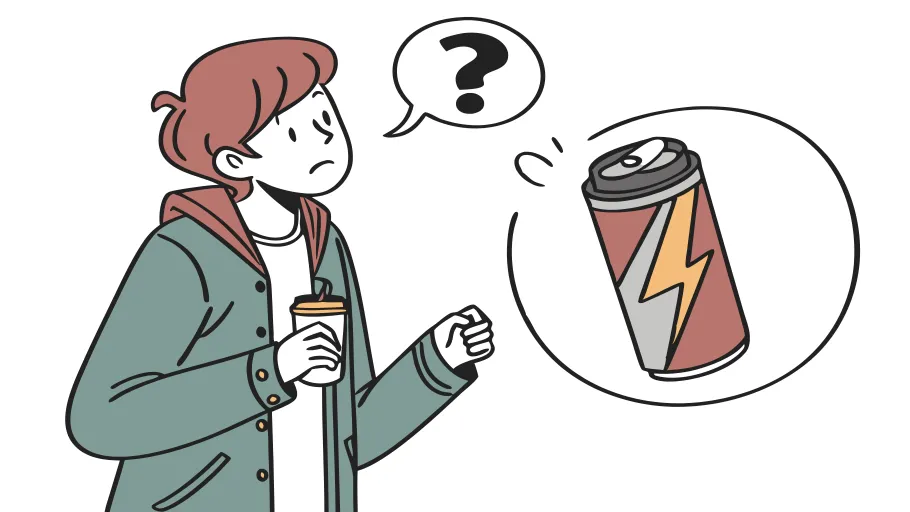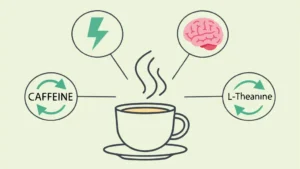When that 3 PM energy crash hits and your eyelids feel heavy, you face a crucial choice: grab your trusty coffee mug or reach for that colorful energy drink in the fridge? If you’re wondering does coffee have more caffeine than energy drinks, you’re asking the right question – but the answer might surprise you.
The truth is, it depends entirely on what you’re comparing. While a standard cup of coffee might edge out smaller energy drinks in caffeine content, larger energy drinks can easily pack more punch than your typical coffee serving. But caffeine content is just one piece of this complex puzzle.
Let’s dive deep into the coffee vs. energy drink debate, explore what else you’re consuming, and help you choose the healthiest caffeine source for your lifestyle.
How Much Caffeine Is in Coffee? What Affects the Strength
What Affects Coffee’s Caffeine Content
Caffeine in coffee varies dramatically based on several key factors that most people don’t realize. The type of bean makes a huge difference – robusta beans contain nearly twice the caffeine of arabica beans, with robusta averaging 2.7% caffeine content compared to arabica’s 1.5%.
The roasting process also matters. Light roasted beans actually retain more caffeine than their medium or dark roasted counterparts, contrary to what many people believe.
Surprisingly, brewing method doesn’t impact caffeine extraction as much as you’d expect. While espresso uses finer grinds and higher pressure, temperature and brewing technique “barely impact the amount of caffeine extracted from the bean.” The most critical factor remains the coffee-to-water ratio and serving size.
Coffee Caffeine Content Breakdown
Here’s how different coffee types stack up per 8-ounce serving:
- Drip/Brewed Coffee: 80-200 mg (average 95-150 mg)
- Cold Brew: 100-200 mg (can reach 285 mg in 12 oz)
- French Press: 80-135 mg
- Instant Coffee: 45-57 mg
- Espresso: 75 mg per shot (typically 1-2 shots per drink)
- Decaf Coffee: 2-15 mg
Cold brew deserves special attention as it often contains more caffeine than hot coffee. A typical 16-ounce cold brew contains 200-300 mg of caffeine due to its extended steeping time of 12-24 hours.
How Much Caffeine Is in Energy Drinks? Top Brands Compared
The Complex World of Energy Drink Ingredients
Caffeine in energy drinks presents a more complex picture with content varying wildly between brands. The average 16-ounce energy drink contains approximately 210 mg of caffeine, which is comparable to a medium coffee. However, this average masks significant variations.
Popular energy drink ingredients and their caffeine content include:
- Red Bull (8.4 fl oz): 80 mg
- Red Bull (16 fl oz): 151 mg
- Monster Energy (16 fl oz): 160 mg
- Monster Ultra (16 fl oz): 140-150 mg
- Bang Energy (16 fl oz): 300 mg
- Celsius (12 fl oz): 200 mg
- 5-Hour Energy (1.93 fl oz): 200 mg
The serving size makes a dramatic difference. While Red Bull’s standard 8.4-ounce can contains only 80 mg of caffeine – about the same as a cup of coffee – larger 16-ounce energy drinks can pack 300 mg or more, significantly exceeding most coffee servings.
Beyond Caffeine: What Else Are You Really Drinking?
Coffee: Nature’s Simple Energy Solution
Coffee’s appeal extends far beyond caffeine. This naturally derived beverage contains over 1,000 antioxidants in unprocessed beans, with hundreds more developing during roasting. Coffee shows more antioxidant activity than green tea and cocoa, two renowned antioxidant superstars.
Coffee’s antioxidant profile includes:
- Phenolic acids (the largest portion)
- Flavonoids
- Chlorogenic acids
- Polyphenols
- Melanoidins
These compounds help fight inflammation and protect against oxidative stress, potentially reducing the risk of chronic conditions including Type 2 diabetes, heart disease, Alzheimer’s disease, Parkinson’s disease, and certain cancers.
Coffee naturally contains essential nutrients including vitamins B2 and B5, potassium, niacin, and magnesium. Black coffee contains virtually no calories or sugar, making it an efficient energy source without metabolic burden – quite different from many foods that cause fatigue.
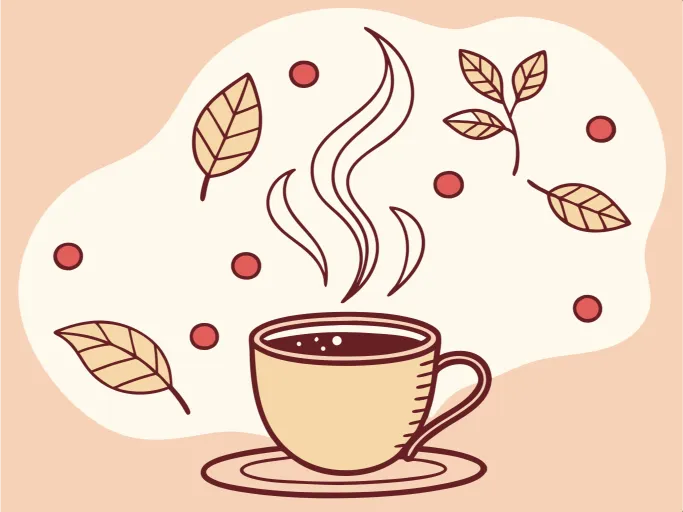
Energy Drinks: The Complex Cocktail
Energy drinks present a markedly different nutritional profile. Research analyzing 75 energy products found an average of 18.2 ingredients per product, with 15 products containing proprietary blends with undisclosed amounts.
Common energy drink ingredients include:
- Taurine (37.3% prevalence): An amino acid that helps maintain electrolyte balance
- B Vitamins: Vitamin B6 (72% prevalence), B3 (67%), B12 (67%), and B5 (37.3%)
- Guarana: A natural caffeine source that adds to total caffeine content
- L-Carnitine: Helps convert fat to energy
- Inositol: Aids metabolism and nutrient processing
- Sugar or artificial sweeteners: Many contain 26-54 grams of sugar per can
The concern lies in concentration and interaction. Many energy drinks contain B-vitamins “well above the recommended daily value,” with some products showing B12 levels over 5,000% of daily value.
Health Impact: The Real Difference Maker
Coffee’s Proven Health Benefits
Extensive research supports coffee’s health benefits as the healthiest caffeine source. Coffee has been studied for centuries, providing robust evidence of its effects. Regular coffee consumption is associated with:
- Reduced disease risk: Lower incidence of Type 2 diabetes, heart attack, stroke, liver disease, and neurodegenerative conditions
- Enhanced athletic performance: Up to 12% improvement in physical performance
- Improved cognitive function: Better memory, mood, vigilance, and reaction times
- Anti-inflammatory properties: Helps combat chronic inflammation
Coffee’s consumption pattern also provides advantages. Coffee is typically sipped slowly, allowing for gradual caffeine absorption and reducing the likelihood of jittery side effects compared to quickly consumed energy drinks. This slower absorption can help maintain stable blood sugar and energy levels throughout the day.
Energy Drinks’ Health Concerns and Side Effects
Side effects of caffeine are more pronounced with energy drinks due to their complex ingredient profiles. Energy drinks carry increased health risks, particularly with frequent consumption. The combination of high caffeine, sugar, and additional stimulants can cause:
- Cardiovascular effects: Increased heart rate, blood pressure, and arterial spasms that may lead to heart attacks
- Cardiac arrhythmias: Irregular heartbeat patterns, including atrial fibrillation
- Blood sugar disruption: Rapid spikes followed by crashes due to high sugar content
- Increased hospitalization risk: Growing reports of caffeine overdose cases requiring medical attention
Particular concern exists for younger populations. Medical experts strongly advise against energy drinks for children and teens due to their caffeine and sugar levels, which can cause increased heart rate, anxiety, high blood pressure, and sleep problems.
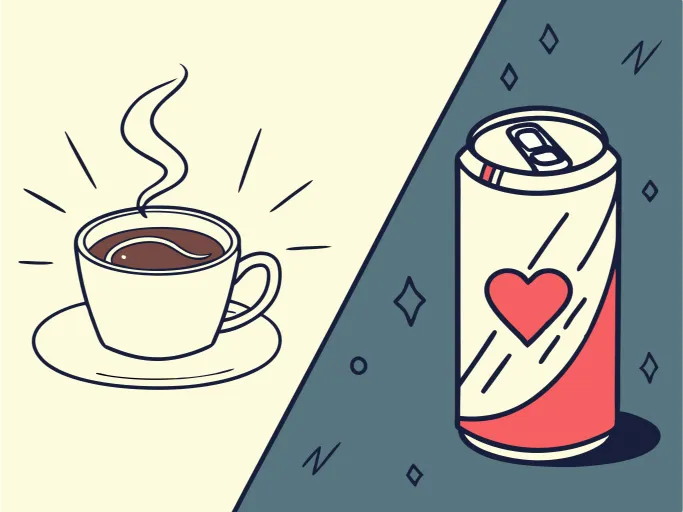
How Much Caffeine Is Too Much? Safe Consumption Guidelines
Daily Caffeine Recommendations
How much caffeine is too much is a question health authorities take seriously. The FDA recommends no more than 400 mg of caffeine daily for most healthy adults – roughly equivalent to four cups of brewed coffee. Pregnant women should limit intake to less than 200 mg daily.
Individual sensitivity varies significantly. Some people are more sensitive to caffeine’s effects, and factors like medications, medical conditions, and body weight influence tolerance. Signs you may be consuming too much caffeine include:
- Restlessness and anxiety
- Insomnia and sleep disruption
- Digestive upset
- Irregular heartbeat
- Jitters and shakiness
If you’re experiencing these symptoms, consider exploring natural energy boosters or implementing tips to boost energy without relying solely on caffeine.
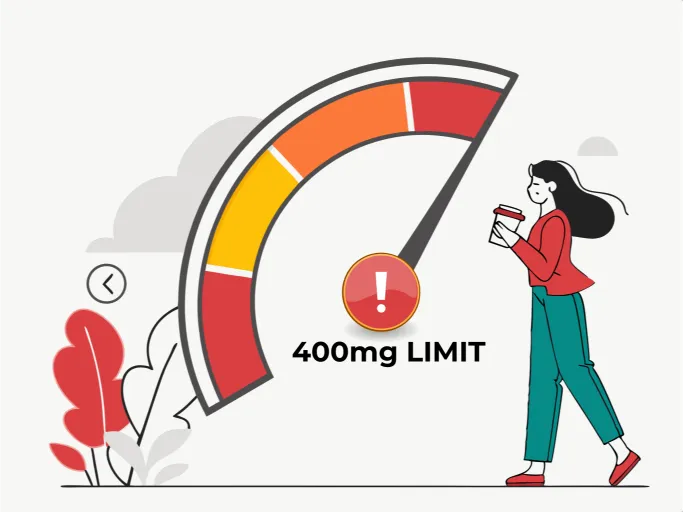
Natural Energy Boosters: Beyond Caffeine
Holistic Approaches to Sustained Energy
While debating coffee vs energy drink options, it’s worth considering natural energy boosters that don’t rely solely on caffeine. Many people find that addressing underlying causes of low energy provides more sustainable results than constantly reaching for caffeinated beverages.
Consider these natural alternatives:
- Proper hydration: Understanding the benefits of hydration for energy
- Strategic nutrition: Choosing foods that improve stamina and support mitochondrial function
- Quality sleep: Ensuring adequate rest to avoid being tired after 8 hours sleep
- Regular movement: Incorporating best exercises energy into your routine
For those dealing with persistent fatigue, addressing issues like inflammation and fatigue or exploring basic fatigue management strategies might be more beneficial than increasing caffeine intake.
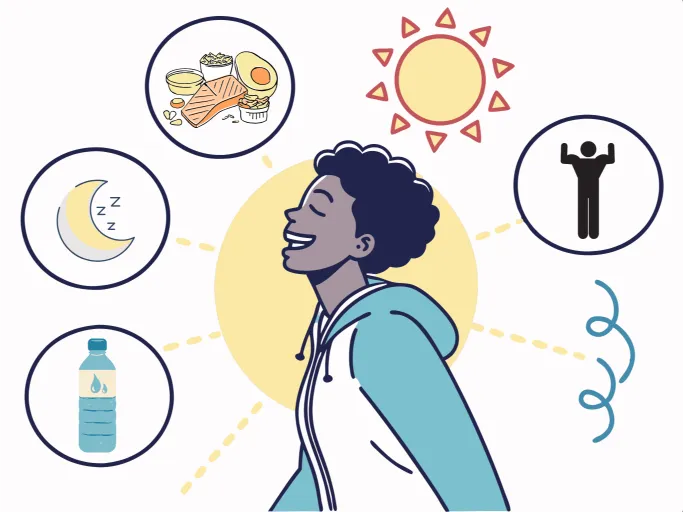
Making the Right Choice for You
Does Coffee Have More Caffeine? The Final Answer
So, does coffee have more caffeine than energy drinks? The answer depends entirely on what you’re comparing:
Key takeaways for caffeine content:
- Standard coffee: 95-150 mg per 8 oz
- Cold brew: 200-300 mg per 16 oz
- Small energy drinks: 80-100 mg per 8-12 oz
- Large energy drinks: 160-300 mg per 16 oz
Choosing the Healthiest Caffeine Source
The “better” choice depends on your health goals and preferences. If you prioritize natural ingredients, antioxidant benefits, and sustained energy without sugar crashes, coffee emerges as the superior option. Energy drinks may provide a quick boost but come with additional ingredients and health concerns that coffee avoids.
For optimal health, consider these factors:
Choose coffee if you want:
- Proven health benefits and natural antioxidants
- No added sugars or artificial ingredients
- Gradual caffeine absorption
- Lower risk of side effects
Consider energy drinks only if:
- You need an immediate energy boost
- You choose smaller sizes and limit frequency
- You’re mindful of total daily caffeine intake from all sources
Remember that the average energy drink contains 210 mg of caffeine – already more than half the recommended daily limit.
Making Informed Energy Choices
Both beverages can fit into a healthy lifestyle when consumed mindfully. The key lies in understanding what you’re putting into your body and making informed choices based on your individual health needs, caffeine tolerance, and lifestyle preferences.
Whether you choose the aromatic ritual of brewing coffee or the convenient grab-and-go nature of energy drinks, stay mindful of your total caffeine consumption from all sources throughout the day. Your body – and your sleep schedule – will thank you for the consideration.
Consider also exploring complementary strategies like implementing high-energy morning routines, learning to beat afternoon fatigue naturally, or understanding natural electrolytes for energy to support your overall energy goals.
What’s your go-to source for a quick energy boost? Have you noticed differences in how coffee versus energy drinks affect your energy levels throughout the day?


